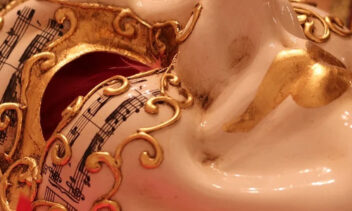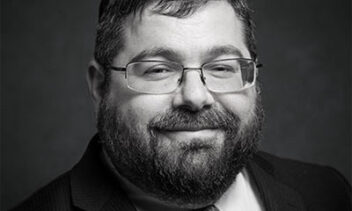Download the full reader here.
Is laughter radical? As the faint scent of Purim strengthens in the fragrant air of Adar, we are thinking about the radical religious value of laughter.
To start you off, we included a re-edited essay on the weighty questions of laughter’s place in religious life from 18Forty’s early exploration of comedy. To follow up this tasty introduction, we put together some of our favorite articles on the many faces of this radical laughter.
- First up, we have “The Strange and Violent History of the Ordinary Grogger” by David Zvi Kalman, a fascinating journalistic read on our favorite noisemaker.
- Next up, we have a fascinating academic read, “Instituting the Holocaust: Comic Fiction and the Moral Career of the Survivor,” by Adam Rovner, which explores the complex interaction between humor, tragedy, and the Holocaust.
- Last up, we have Henry Abramson’s fun and fascinating read on the history of Haman effigies, “The Romans tried to ban wild Purim parties in 408 CE – for a very good reason.”
For extra credit, here are some Purim articles from our house writers at 18Forty, host David Bashevkin’s love letter to the letters of Megillah, “Letter Perfect,” and editor Yehuda Fogel’s (AKA myself) “Purim and Paul: The Torah Veiled and Unveiled.” We have mercy on your printers and our planet’s precious trees, so we didn’t add them to the PDF, but take a look and let us know what you think.
Wherever you are, and whatever you practice, we wish you a joyful, grogger-like Purim, full of spinning dances and gifts to loved ones. Freilechen Purim!
Laughing Religiously/Religiously Laughing
Rabbi Elchanan Nir, an Israeli poet, novelist, and thinker, wrote If Your Heart Runs (p. 108), which discusses descent and ascent in religious life. At the end of a lengthy chapter about the Alter Rebbe, the Russian Rabbi Shneur Zalman of Liadi (1745-1813), Elchanan asks the following question: Did the Alter Rebbe have a sense of humor?
His explanation for why he finds that question important provides a powerful illumination into the idea of the comedic in religious life:
One year, I learned the sefer “Netzach Yisrael” with my students, written by the Maharal of Prague, Rabbi Yehuda Loew (1520-1609). This book deals with exile and redemption, a subject relevant to the lives of many students, both on a personal-existential level and on a national level. However, the students never connected with the subject matter. They knew the material, they understood the content, but they felt distant from the material through it all.
At the end of the year, when I asked them whether they benefited from their encounter with this work, they acknowledged the importance of the sefer, but said that it felt distant to them still, foreign. “Only now do I understand why I felt this way”, one student said: “The Maharal obviously didn’t have a sense of humor.” That student wasn’t saying that the Maharal didn’t have jokes—although this might also be true—but rather a sense of humor.
Humor is deep; The Zohar (2, 107a) refers to King David as “the King’s jester,” as he knows how to free the king from the gravity necessary to ruling. Humor engenders an ability to encounter life from within the heavy constraints of the gravity of the human condition and the gravity of religious life.
In a way, asking if the author of a work has a sense of humor is really asking a deeper question: Was there an author to this work? While someone put thought to paper, was that person struggling with the stuff of life? Was this work born from a real encounter with life, or just with philosophy?
Asking if the Maharal had a sense of humor is like asking if God has a sense of humor: We may feel like there is a Creator to this world, but it’s easy to think of this Creator as a transcendent, Spinoza-esque Creator—above, distant, prone to ruling with gravitas. If we can feel like the Author—whether of Netzach Yisrael or this world—has a sense of humor, it becomes just a bit easier to relate to the Author as Real, and not just a foreign truth or ani ma’amin.
Do you put your personal interests in perspective, and learn to laugh like God, and with God?
In The Name of the Rose, Italian author-philosopher Umberto Eco places a theological dispute between two monks about laughter at the heart of a book that would go on to become one of the best-selling books ever published. In this murder-mystery/literary journey, a theological dispute about whether Franciscans are heretical brings together the Franciscan William of Baskerville and the elderly non-Franciscan Jorge of Borges.
At a pivotal point in the book, Jorge of Borges, a blind, elderly member of the monastery, shouts at the Franciscan William: “A monk should not laugh! Only a fool raises his voice in laughter!” Jorge notes, with no slight disapproval, that Franciscans like William look indulgently upon laughter.
William: Yes, it’s true. Saint Francis was much disposed to laughter.
Jorge: Laughter is a devilish wind which deforms the lineaments of the face and makes men look like monkeys.
William: Monkeys do not laugh. Laughter is particular to man.
Jorge: As is sin. Christ never laughed.
William: Can we be so sure?
Jorge: There is nothing in the Scriptures to say that He did.
William: And there’s nothing there to say that He did not. Even the saints have been known to employ comedy to ridicule the enemies of the faith. For example, when the Pagans plunged Saint Maurus into the boiling water, he complained that his bath was cold. The Sultan put his hand in and scalded himself.
Jorge: A saint immersed in boiling water does not play childish tricks. He restrains his cries and suffers for the truth!
William: And yet, Aristotle devoted his second book of poetics to comedy as an instrument of truth.
Spoiler alert: In a later scene, William discovers that Jorge had taken steps to poison any who read Aristotle’s Poetics, which discusses comedy, and the dispute continues:
William: Venerable brother, there are many books that speak of comedy. Why does this one fill you with such fear?
Jorge: Because it’s by Aristotle.
William: But what is so alarming about laughter?
Jorge: Laughter kills fear and without fear there can’t be any faith. Because without fear of the devil there is no more need of God.
William: But you will not eliminate laughter by eliminating that book.
Jorge: No, to be sure. Laughter will remain the common man’s recreation but what would happen if, because of this book, learned men work to pronounce it permissible to laugh at everything? Can we laugh at God? The world would relapse into chaos.
In Jorge’s eyes, laughter in religious life erodes the fear that keeps faith alive. But for William, laughter is a part of religious life, and keeps faith alive in its own way. “Can we laugh at God?” Indeed, can we? Should we? Does laughter kill fear, and thus faith? Does God have a sense of humor? Do we?
This question touches upon our deep concern for laughter, and the subsequent concerns born in our appreciation for laughter. And so Nir asks: Did the Alter Rebbe have a sense of humor? Feldman asks: Does God have a sense of humor? And across the theological ocean, Umberto Eco asks: Did Christ have a sense of humor? To each, the answer might just be: It depends. Do you, the reader, seek to find humor in these works? Do you put your personal interests in perspective, and learn to laugh like God, and with God?
Two hundred years after the Alter Rebbe, a different Russian Jew, the singer Regina Spektor, commented in song about the ironic challenge of laughter in religious life. It is easier to find God funny when one is in control. “God can be funny,” she sings, “at a cocktail party when listening to a God-themed joke…or when presented like a genie who does magic like Houdini or grants wishes like Jiminy Cricket or Santa Clause.” But when the act of living grows more complicated, more vulnerable, that laughter rings hollow:
No one laughs at God in a hospital
No one laughs at God in a war
No one’s laughing at God when they’re starving or freezing or so very poor
No one laughs at God when the doctor calls after some routine tests
No one’s laughing at God
When it’s gotten real late and their kid’s not back from the party yet
But as her song winds down, Spektor softly sings:
No one’s laughing at God
No one’s laughing at God
No one’s laughing at God, we’re all laughing with God
We’re all laughing with God. There are dangers inherent to comedy, possibilities for the cynical edge that laughter sometimes has to creep into one’s life. As Brother Jorge asks: Can we laugh at God? We might answer: We can laugh with God. We can laugh with hope, with faith, and with perspective. While hope and history may not yet rhyme, and while we may not yet have history’s sense of perspective into the travails of our current moment, we can laugh at the shining absurdities that so often make our life worth living.








